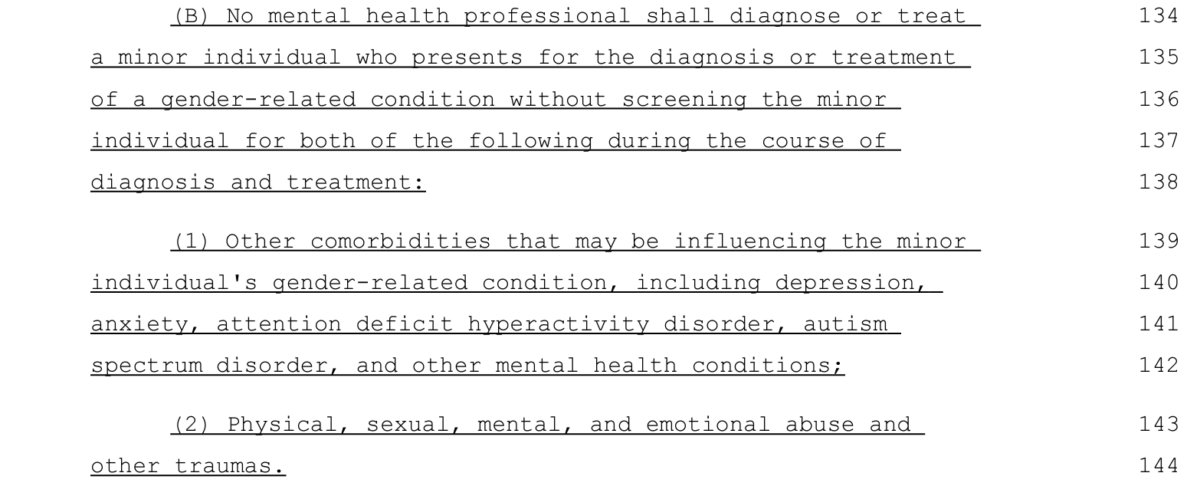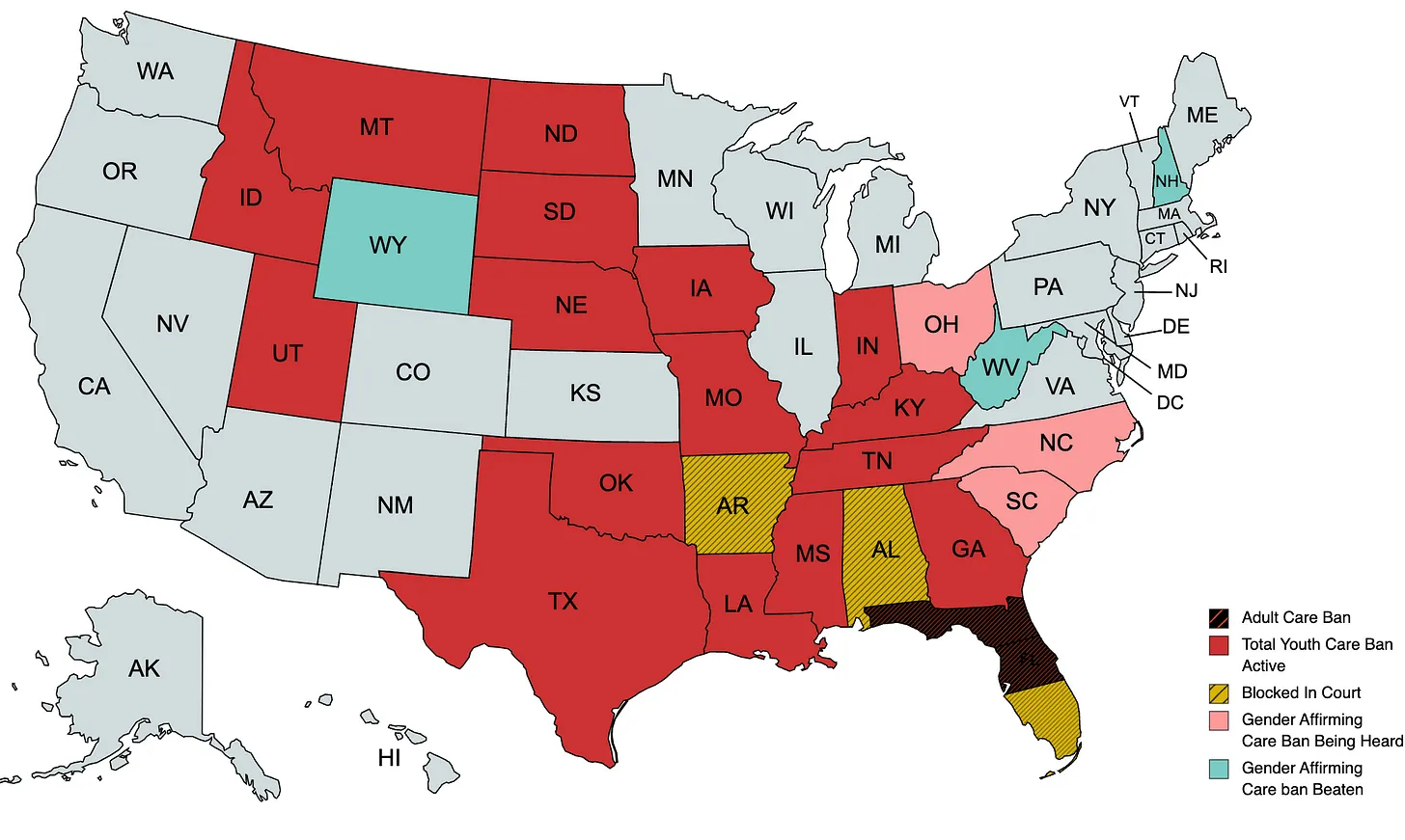In a concerning turn of events, Ohio has become the newest addition to the growing list of states progressing gender affirming care bans for transgender youth out of legislative committees. If Ohio successfully passes this bill, House Bill 68, it will become the 20th state to do so. The bill has weathered numerous iterations and significant setbacks in the past. However, the latest version has emerged with an unprecedented provision unseen in similar bills from other states: a mandate to screen for “influences,” or “causes,” of being transgender.
The bill mandates that before therapists can diagnose a patient with gender dysphoria, they must first screen for a host of other potential “causes” that might explain an individual’s transgender identity. Included in these are anxiety, depression, and autism. This provision ignores established scientific consensus: none of these conditions “cause” someone to be transgender. Furthermore, there are no existing diagnostic tools or guidelines to establish the “cause” of someone’s gender identity, because fundamentally, such “causes” are nonexistent.
See Atlanta Magazine’s analysis of an interview with Dr. Varun Warrier, a gender dysphoria researcher from the University of Cambridge:
And while people diagnosed with gender dysphoria may be slightly more likely to have autism spectrum disorder, this is correlation, not causation: there is no evidence that being on the autism spectrum causes people to identify as transgender, and researchers say there’s no reason to deny people with autism or other neurodivergent diagnoses the same healthcare as neurotypical people.
“Just because these things can co-occur does not mean that one should be denied,” Varun Warrier, a researcher at University of Cambridge who published a 2020 study on the link between autism and gender diversity, told Spectrum News.
The list of potential causes forwarded for being transgender in the bill include:
- ADHD
- Autism
- Anxiety
- Depression
- Physical, Mental, and Emotional Abuse
- Trauma
You can see the relevant portion of HB 68 here:

Moreover, even when these so-called “causes” are screened for and no underlying reasons for a person’s gender identity are found, treatment remains banned. Essentially, these screenings don’t provide access to gender-affirming care for trans youth; rather, they erect a formidable barrier to even obtaining mental healthcare for transgender youth.
Disturbingly, these provisions essentially mandate “gender exploratory therapy,” a new conversion therapy currently pushed by members of Christian conversion therapy organizations such as the American College of Pediatricians. This pseudoscientific group, a strong advocate for conversion therapy, has been classified as a hate group by the Southern Poverty Law Center. Its deceptive name is expressly designed to confuse legislators into mistaking it for the American Academy of Pediatrics, the respected medical organization representing the vast community of pediatricians across the United States.
Gender exploratory therapy seeks to delay gender affirming care for transgender people indefinitely while “exploring” many potential causes for transgender people’s gender identity. Similar to crisis pregnancy centers, the vast majority of gender exploratory therapists will never provide authorization for gender affirming care, nor will they ever give a diagnosis of gender dysphoria. Instead, they aim to utilize the delay to get a transgender teenager as far into puberty as possible until they either age out of care or give up entirely on the idea of transition.
Representative Click has himself testified in support of “watchful waiting,” which claims that transgender people will “grow out of being trans,” and has also implicitly endorsed gender exploratory therapy in multiple tweets. Likewise, Click has himself admitted to “counseling people” into “overcoming” being LGBTQ:
If HB 68 passes, Ohio will become the 20th state to ban gender affirming care for trans youth. The bill contains no provisions that would allow people already receiving care to continue receiving that care. It does not only ban gender affirming surgery, but also puberty blockers and hormone therapy. It limits mental healthcare and mandates that all therapists practice invasive questioning of transgender people’s lives to fish for causes of their gender identity. There are no exceptions for care in the bill – all trans youth will be pulled from medication if it passes.
You can see all state gender affirming care bills and their progress here:

Although many gender affirming care bans have passed in the United States this year, Ohio remains one of six Republican states that have moved slower on this issue. Wyoming and New Hampshire defeated their gender affirming care bans entirely, and West Virginia opened up large exceptions for transgender youth to still obtain care in the state. Meanwhile, states that have not passed these bans have moved in the other direction, often passing laws that protect transgender individual’s care from any out of state prosecution or investigation. Transgender people and their loved ones in Ohio now find themselves in a precarious position. They wait anxiously to determine whether they will successfully defeat the bill, or whether their state will pioneer the latest distressing method of targeting transgender individuals with discriminatory laws.
Note: This piece was republished with permission from Erin In The Morning.
Our most important fundraising appeal of the year
December is the most critical time of year for Truthout, because our nonprofit news is funded almost entirely by individual donations from readers like you. So before you navigate away, we ask that you take just a second to support Truthout with a tax-deductible donation.
This year is a little different. We are up against a far-reaching, wide-scale attack on press freedom coming from the Trump administration. 2025 was a year of frightening censorship, news industry corporate consolidation, and worsening financial conditions for progressive nonprofits across the board.
We can only resist Trump’s agenda by cultivating a strong base of support. The right-wing mediasphere is funded comfortably by billionaire owners and venture capitalist philanthropists. At Truthout, we have you.
We’ve set an ambitious target for our year-end campaign — a goal of $250,000 to keep up our fight against authoritarianism in 2026. Please take a meaningful action in this fight: make a one-time or monthly donation to Truthout before December 31. If you have the means, please dig deep.
